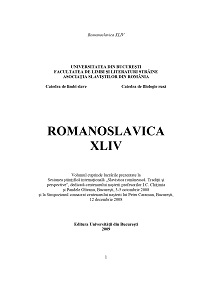Biografie şi creaţie în clocotrism
Biography and Creativity in Clocotrism
Author(s): Mariana DanSubject(s): Romanian Literature, Serbian Literature, Translation Studies, Theory of Literature, Sociology of Art, Sociology of Literature
Published by: Editura Universităţii din Bucureşti
Keywords: Biography; creation; clocotrism
Summary/Abstract: In spite of the fact that Serbo-Romanian cross-cultural relations were flourishing in the 7th and 8th decade of the last century, their record is very poor. It is the merit of the Serb-Wallach poet, Adam Puslojić, to have initiated and maintained those relations, by his many-sided artistic, cultural and friendly approach to Romanian artists and by his overwhelming creative activity: as a translator from Romanian into Serbian (he translated most of the 20th century Romanian poets!), as an author of poetry in Romanian, as a founder of the contemporary international neo avant-garde artistic movement clocotrism, in which the most numerous artists, besides the Serbian ones, were the Romanians. This paper reveals the roots and activity of clocotrism, defining it as an important neo avant-garde movement in SE Europe, the poetics of which anticipates postmodernism. Facts presented in this paper reveal that the participation of the Romanian authors is not purely formal, but decisive, as it influenced the establishing of a genuine artistic conception. Founded on performances, and on group literary research (’creative laboratories’), clocotrism bridges the gap between the biographical artistic personality and the artist as a creator of art, in a theoretical climate in which the literary text was considered as an entity independent from the author who wrote it. Clocotrism’s main principles are founded on: 1) the physical participation within the performances, 2) the collective creation of art in process, 3) the concept of ‘spirit’/’spirituality’ which is equally the principle of art and life itself. In the communist regime of both countries, the presence of the auctorial ego in public performances, speaking out what he thinks, although under a metaphorical cover, is deeply significant, and, besides the artistic achievements, it represents a proof of mutual trust. The international multidimensional, multidisciplinary and multimedia aspects of clocotrism, and the fact that numerous famous Romanian artists took part in it, represent facts of great importance which, overcoming any formal or official cross-cultural concepts of influence, require a further, thorough approach. If neo avant-garde manifestations were banned in communist Romania at that time, many Romanian artists found a favourable ground of creative expression in Belgrade.
Journal: Romanoslavica
- Issue Year: XLIV/2009
- Issue No: 1
- Page Range: 63-76
- Page Count: 14
- Language: Romanian

